Analyzing Aboriginal Knowledge and Experiences in the Workplace
VerifiedAdded on 2022/08/15
|10
|2651
|12
Essay
AI Summary
This essay delves into the multifaceted challenges faced by Aboriginal and Torres Strait Islander peoples in the Australian workplace. It examines the historical context and ongoing issues such as discrimination in hiring practices, language barriers, gender pay gaps, and the impact of limited educational opportunities. The author analyzes employment statistics, highlighting the disparities between Indigenous and non-Indigenous Australians, and explores factors contributing to unemployment and underemployment. The essay also addresses the concept of self-determination, the importance of cultural respect, and the need for government and organizational policies that promote equity and inclusion. The author suggests practical solutions, including mentoring programs, cultural awareness training, quota systems, and educational initiatives, to foster a more respectful and equitable workplace for Aboriginal Australians. The essay concludes by emphasizing the importance of addressing these issues for the social and economic advancement of Indigenous communities and the nation as a whole.
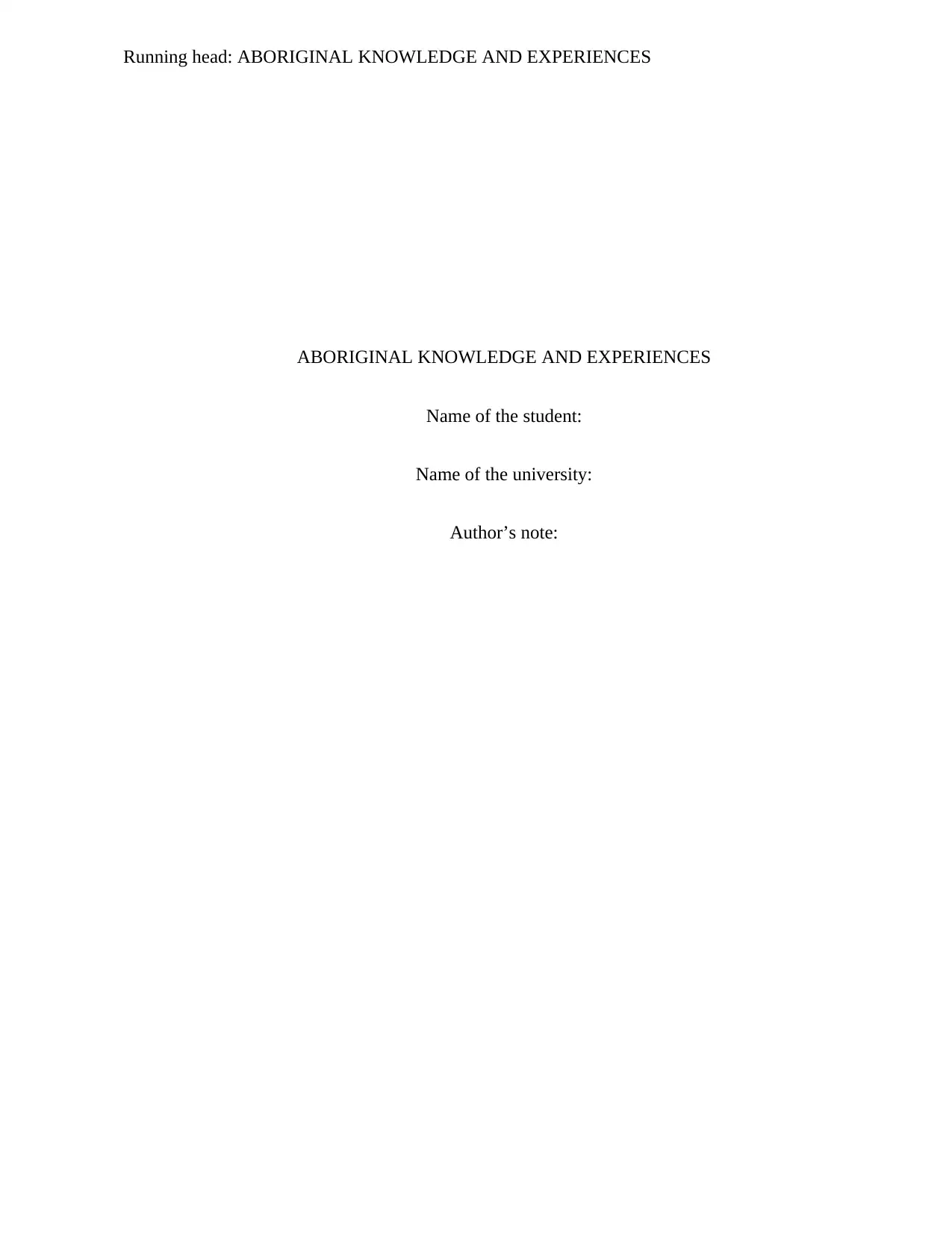
Running head: ABORIGINAL KNOWLEDGE AND EXPERIENCES
ABORIGINAL KNOWLEDGE AND EXPERIENCES
Name of the student:
Name of the university:
Author’s note:
ABORIGINAL KNOWLEDGE AND EXPERIENCES
Name of the student:
Name of the university:
Author’s note:
Paraphrase This Document
Need a fresh take? Get an instant paraphrase of this document with our AI Paraphraser
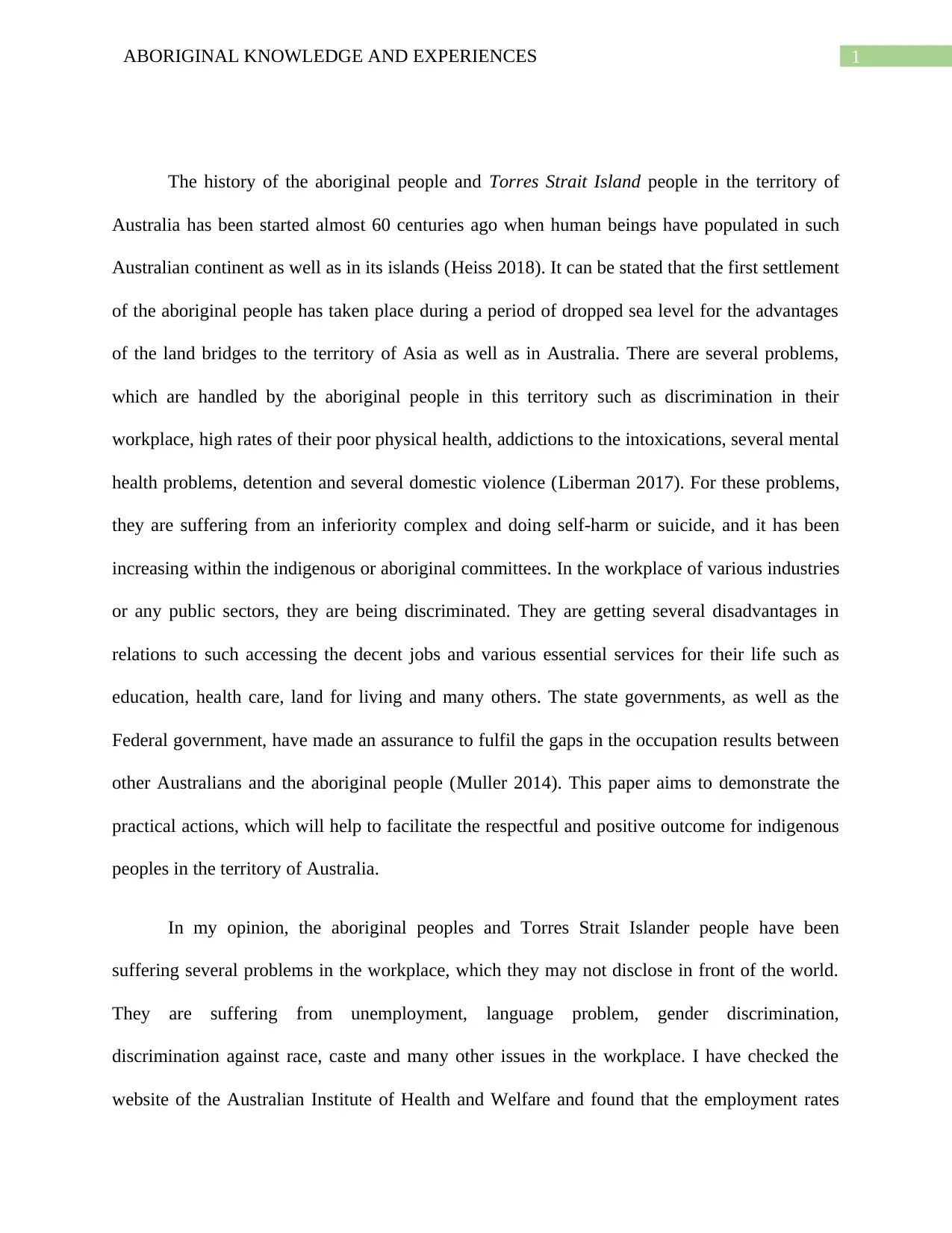
1ABORIGINAL KNOWLEDGE AND EXPERIENCES
The history of the aboriginal people and Torres Strait Island people in the territory of
Australia has been started almost 60 centuries ago when human beings have populated in such
Australian continent as well as in its islands (Heiss 2018). It can be stated that the first settlement
of the aboriginal people has taken place during a period of dropped sea level for the advantages
of the land bridges to the territory of Asia as well as in Australia. There are several problems,
which are handled by the aboriginal people in this territory such as discrimination in their
workplace, high rates of their poor physical health, addictions to the intoxications, several mental
health problems, detention and several domestic violence (Liberman 2017). For these problems,
they are suffering from an inferiority complex and doing self-harm or suicide, and it has been
increasing within the indigenous or aboriginal committees. In the workplace of various industries
or any public sectors, they are being discriminated. They are getting several disadvantages in
relations to such accessing the decent jobs and various essential services for their life such as
education, health care, land for living and many others. The state governments, as well as the
Federal government, have made an assurance to fulfil the gaps in the occupation results between
other Australians and the aboriginal people (Muller 2014). This paper aims to demonstrate the
practical actions, which will help to facilitate the respectful and positive outcome for indigenous
peoples in the territory of Australia.
In my opinion, the aboriginal peoples and Torres Strait Islander people have been
suffering several problems in the workplace, which they may not disclose in front of the world.
They are suffering from unemployment, language problem, gender discrimination,
discrimination against race, caste and many other issues in the workplace. I have checked the
website of the Australian Institute of Health and Welfare and found that the employment rates
The history of the aboriginal people and Torres Strait Island people in the territory of
Australia has been started almost 60 centuries ago when human beings have populated in such
Australian continent as well as in its islands (Heiss 2018). It can be stated that the first settlement
of the aboriginal people has taken place during a period of dropped sea level for the advantages
of the land bridges to the territory of Asia as well as in Australia. There are several problems,
which are handled by the aboriginal people in this territory such as discrimination in their
workplace, high rates of their poor physical health, addictions to the intoxications, several mental
health problems, detention and several domestic violence (Liberman 2017). For these problems,
they are suffering from an inferiority complex and doing self-harm or suicide, and it has been
increasing within the indigenous or aboriginal committees. In the workplace of various industries
or any public sectors, they are being discriminated. They are getting several disadvantages in
relations to such accessing the decent jobs and various essential services for their life such as
education, health care, land for living and many others. The state governments, as well as the
Federal government, have made an assurance to fulfil the gaps in the occupation results between
other Australians and the aboriginal people (Muller 2014). This paper aims to demonstrate the
practical actions, which will help to facilitate the respectful and positive outcome for indigenous
peoples in the territory of Australia.
In my opinion, the aboriginal peoples and Torres Strait Islander people have been
suffering several problems in the workplace, which they may not disclose in front of the world.
They are suffering from unemployment, language problem, gender discrimination,
discrimination against race, caste and many other issues in the workplace. I have checked the
website of the Australian Institute of Health and Welfare and found that the employment rates
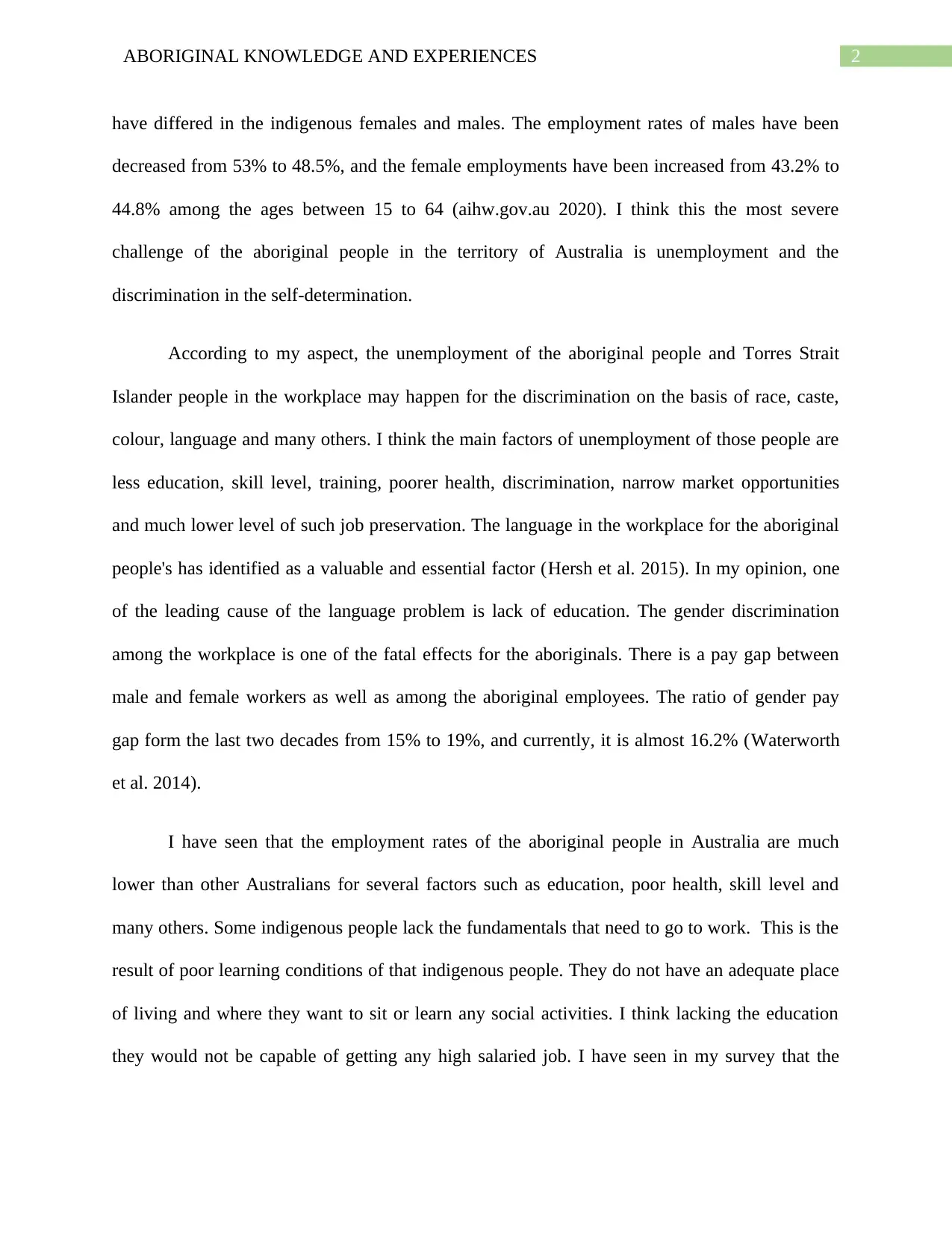
2ABORIGINAL KNOWLEDGE AND EXPERIENCES
have differed in the indigenous females and males. The employment rates of males have been
decreased from 53% to 48.5%, and the female employments have been increased from 43.2% to
44.8% among the ages between 15 to 64 (aihw.gov.au 2020). I think this the most severe
challenge of the aboriginal people in the territory of Australia is unemployment and the
discrimination in the self-determination.
According to my aspect, the unemployment of the aboriginal people and Torres Strait
Islander people in the workplace may happen for the discrimination on the basis of race, caste,
colour, language and many others. I think the main factors of unemployment of those people are
less education, skill level, training, poorer health, discrimination, narrow market opportunities
and much lower level of such job preservation. The language in the workplace for the aboriginal
people's has identified as a valuable and essential factor (Hersh et al. 2015). In my opinion, one
of the leading cause of the language problem is lack of education. The gender discrimination
among the workplace is one of the fatal effects for the aboriginals. There is a pay gap between
male and female workers as well as among the aboriginal employees. The ratio of gender pay
gap form the last two decades from 15% to 19%, and currently, it is almost 16.2% (Waterworth
et al. 2014).
I have seen that the employment rates of the aboriginal people in Australia are much
lower than other Australians for several factors such as education, poor health, skill level and
many others. Some indigenous people lack the fundamentals that need to go to work. This is the
result of poor learning conditions of that indigenous people. They do not have an adequate place
of living and where they want to sit or learn any social activities. I think lacking the education
they would not be capable of getting any high salaried job. I have seen in my survey that the
have differed in the indigenous females and males. The employment rates of males have been
decreased from 53% to 48.5%, and the female employments have been increased from 43.2% to
44.8% among the ages between 15 to 64 (aihw.gov.au 2020). I think this the most severe
challenge of the aboriginal people in the territory of Australia is unemployment and the
discrimination in the self-determination.
According to my aspect, the unemployment of the aboriginal people and Torres Strait
Islander people in the workplace may happen for the discrimination on the basis of race, caste,
colour, language and many others. I think the main factors of unemployment of those people are
less education, skill level, training, poorer health, discrimination, narrow market opportunities
and much lower level of such job preservation. The language in the workplace for the aboriginal
people's has identified as a valuable and essential factor (Hersh et al. 2015). In my opinion, one
of the leading cause of the language problem is lack of education. The gender discrimination
among the workplace is one of the fatal effects for the aboriginals. There is a pay gap between
male and female workers as well as among the aboriginal employees. The ratio of gender pay
gap form the last two decades from 15% to 19%, and currently, it is almost 16.2% (Waterworth
et al. 2014).
I have seen that the employment rates of the aboriginal people in Australia are much
lower than other Australians for several factors such as education, poor health, skill level and
many others. Some indigenous people lack the fundamentals that need to go to work. This is the
result of poor learning conditions of that indigenous people. They do not have an adequate place
of living and where they want to sit or learn any social activities. I think lacking the education
they would not be capable of getting any high salaried job. I have seen in my survey that the
⊘ This is a preview!⊘
Do you want full access?
Subscribe today to unlock all pages.

Trusted by 1+ million students worldwide
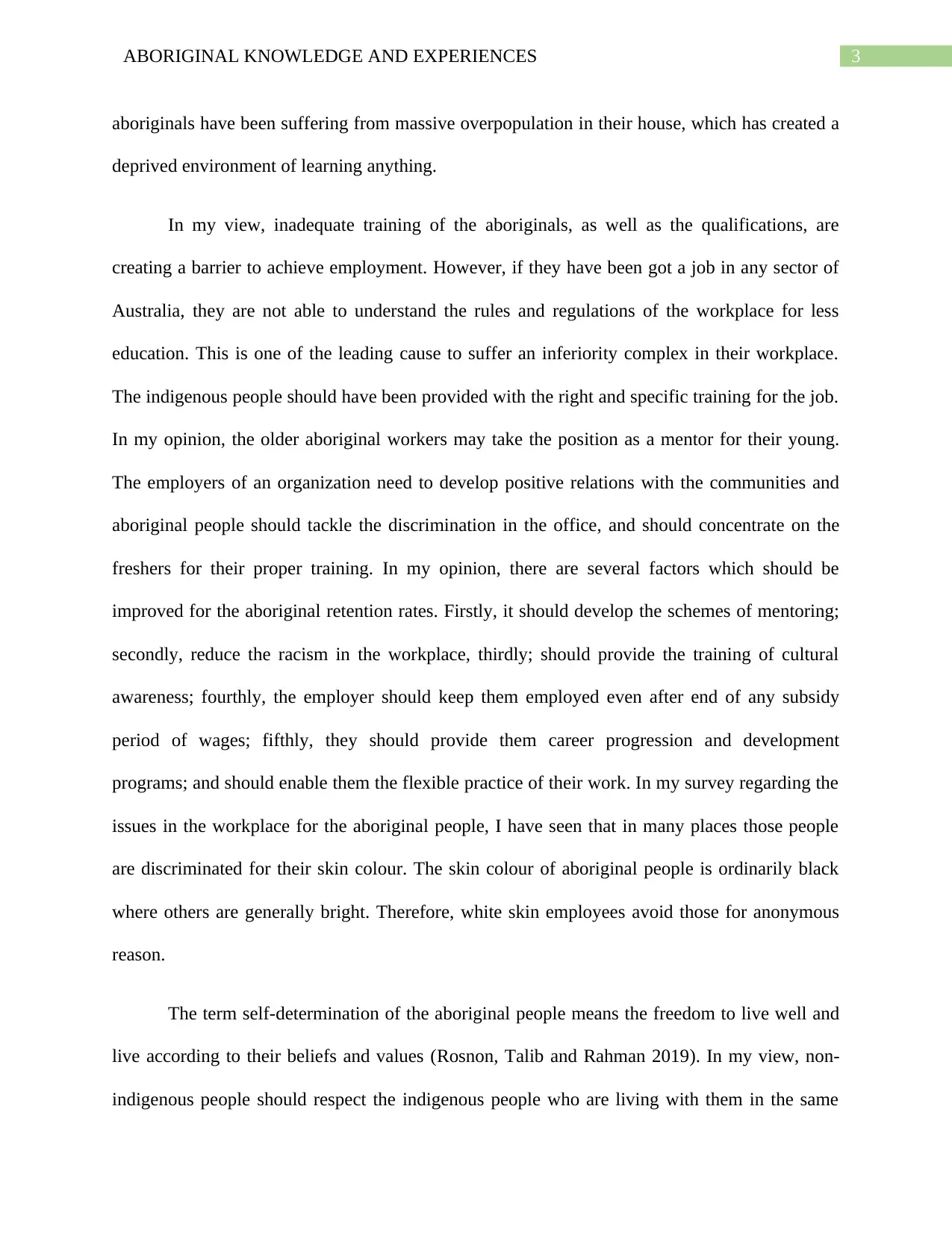
3ABORIGINAL KNOWLEDGE AND EXPERIENCES
aboriginals have been suffering from massive overpopulation in their house, which has created a
deprived environment of learning anything.
In my view, inadequate training of the aboriginals, as well as the qualifications, are
creating a barrier to achieve employment. However, if they have been got a job in any sector of
Australia, they are not able to understand the rules and regulations of the workplace for less
education. This is one of the leading cause to suffer an inferiority complex in their workplace.
The indigenous people should have been provided with the right and specific training for the job.
In my opinion, the older aboriginal workers may take the position as a mentor for their young.
The employers of an organization need to develop positive relations with the communities and
aboriginal people should tackle the discrimination in the office, and should concentrate on the
freshers for their proper training. In my opinion, there are several factors which should be
improved for the aboriginal retention rates. Firstly, it should develop the schemes of mentoring;
secondly, reduce the racism in the workplace, thirdly; should provide the training of cultural
awareness; fourthly, the employer should keep them employed even after end of any subsidy
period of wages; fifthly, they should provide them career progression and development
programs; and should enable them the flexible practice of their work. In my survey regarding the
issues in the workplace for the aboriginal people, I have seen that in many places those people
are discriminated for their skin colour. The skin colour of aboriginal people is ordinarily black
where others are generally bright. Therefore, white skin employees avoid those for anonymous
reason.
The term self-determination of the aboriginal people means the freedom to live well and
live according to their beliefs and values (Rosnon, Talib and Rahman 2019). In my view, non-
indigenous people should respect the indigenous people who are living with them in the same
aboriginals have been suffering from massive overpopulation in their house, which has created a
deprived environment of learning anything.
In my view, inadequate training of the aboriginals, as well as the qualifications, are
creating a barrier to achieve employment. However, if they have been got a job in any sector of
Australia, they are not able to understand the rules and regulations of the workplace for less
education. This is one of the leading cause to suffer an inferiority complex in their workplace.
The indigenous people should have been provided with the right and specific training for the job.
In my opinion, the older aboriginal workers may take the position as a mentor for their young.
The employers of an organization need to develop positive relations with the communities and
aboriginal people should tackle the discrimination in the office, and should concentrate on the
freshers for their proper training. In my opinion, there are several factors which should be
improved for the aboriginal retention rates. Firstly, it should develop the schemes of mentoring;
secondly, reduce the racism in the workplace, thirdly; should provide the training of cultural
awareness; fourthly, the employer should keep them employed even after end of any subsidy
period of wages; fifthly, they should provide them career progression and development
programs; and should enable them the flexible practice of their work. In my survey regarding the
issues in the workplace for the aboriginal people, I have seen that in many places those people
are discriminated for their skin colour. The skin colour of aboriginal people is ordinarily black
where others are generally bright. Therefore, white skin employees avoid those for anonymous
reason.
The term self-determination of the aboriginal people means the freedom to live well and
live according to their beliefs and values (Rosnon, Talib and Rahman 2019). In my view, non-
indigenous people should respect the indigenous people who are living with them in the same
Paraphrase This Document
Need a fresh take? Get an instant paraphrase of this document with our AI Paraphraser
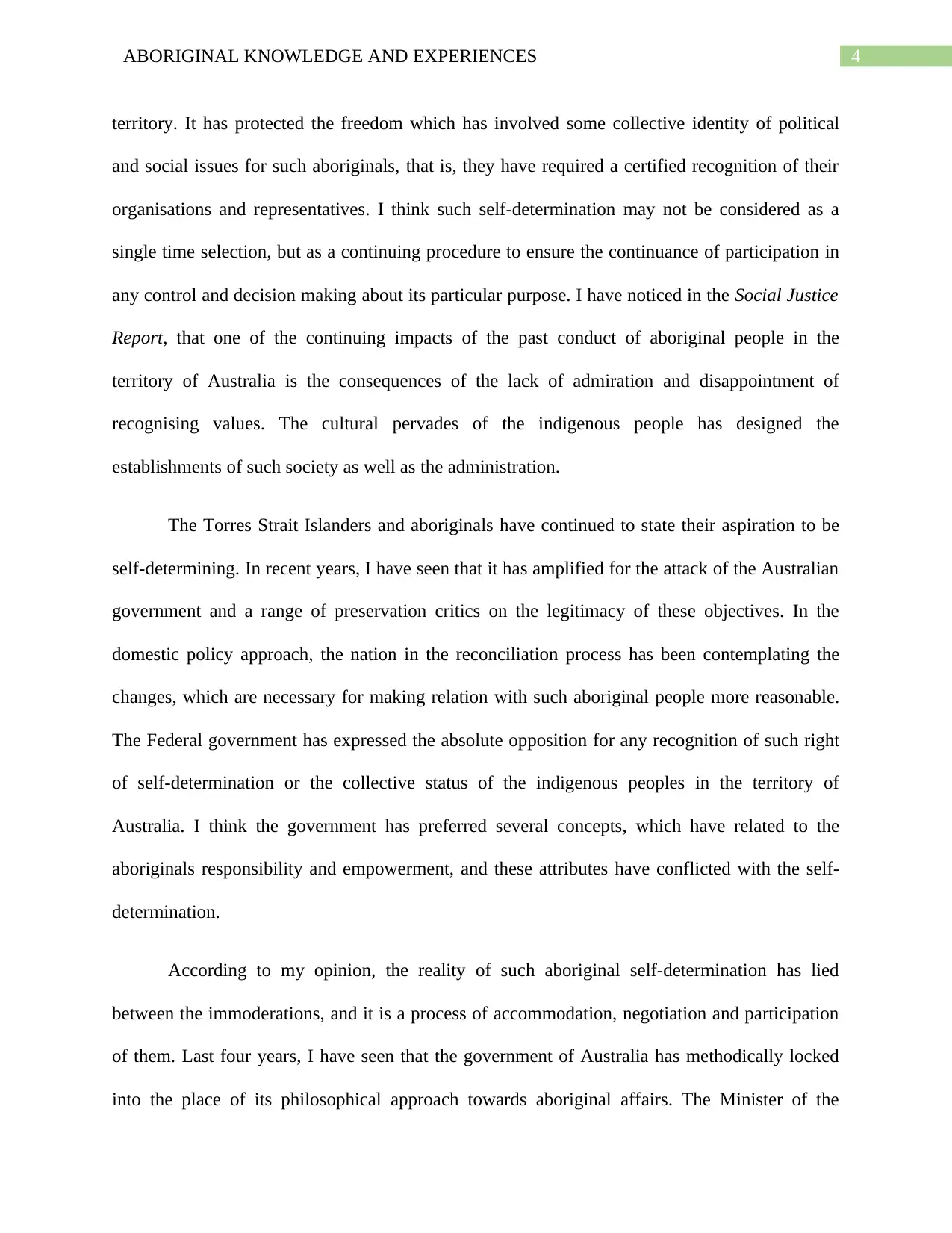
4ABORIGINAL KNOWLEDGE AND EXPERIENCES
territory. It has protected the freedom which has involved some collective identity of political
and social issues for such aboriginals, that is, they have required a certified recognition of their
organisations and representatives. I think such self-determination may not be considered as a
single time selection, but as a continuing procedure to ensure the continuance of participation in
any control and decision making about its particular purpose. I have noticed in the Social Justice
Report, that one of the continuing impacts of the past conduct of aboriginal people in the
territory of Australia is the consequences of the lack of admiration and disappointment of
recognising values. The cultural pervades of the indigenous people has designed the
establishments of such society as well as the administration.
The Torres Strait Islanders and aboriginals have continued to state their aspiration to be
self-determining. In recent years, I have seen that it has amplified for the attack of the Australian
government and a range of preservation critics on the legitimacy of these objectives. In the
domestic policy approach, the nation in the reconciliation process has been contemplating the
changes, which are necessary for making relation with such aboriginal people more reasonable.
The Federal government has expressed the absolute opposition for any recognition of such right
of self-determination or the collective status of the indigenous peoples in the territory of
Australia. I think the government has preferred several concepts, which have related to the
aboriginals responsibility and empowerment, and these attributes have conflicted with the self-
determination.
According to my opinion, the reality of such aboriginal self-determination has lied
between the immoderations, and it is a process of accommodation, negotiation and participation
of them. Last four years, I have seen that the government of Australia has methodically locked
into the place of its philosophical approach towards aboriginal affairs. The Minister of the
territory. It has protected the freedom which has involved some collective identity of political
and social issues for such aboriginals, that is, they have required a certified recognition of their
organisations and representatives. I think such self-determination may not be considered as a
single time selection, but as a continuing procedure to ensure the continuance of participation in
any control and decision making about its particular purpose. I have noticed in the Social Justice
Report, that one of the continuing impacts of the past conduct of aboriginal people in the
territory of Australia is the consequences of the lack of admiration and disappointment of
recognising values. The cultural pervades of the indigenous people has designed the
establishments of such society as well as the administration.
The Torres Strait Islanders and aboriginals have continued to state their aspiration to be
self-determining. In recent years, I have seen that it has amplified for the attack of the Australian
government and a range of preservation critics on the legitimacy of these objectives. In the
domestic policy approach, the nation in the reconciliation process has been contemplating the
changes, which are necessary for making relation with such aboriginal people more reasonable.
The Federal government has expressed the absolute opposition for any recognition of such right
of self-determination or the collective status of the indigenous peoples in the territory of
Australia. I think the government has preferred several concepts, which have related to the
aboriginals responsibility and empowerment, and these attributes have conflicted with the self-
determination.
According to my opinion, the reality of such aboriginal self-determination has lied
between the immoderations, and it is a process of accommodation, negotiation and participation
of them. Last four years, I have seen that the government of Australia has methodically locked
into the place of its philosophical approach towards aboriginal affairs. The Minister of the
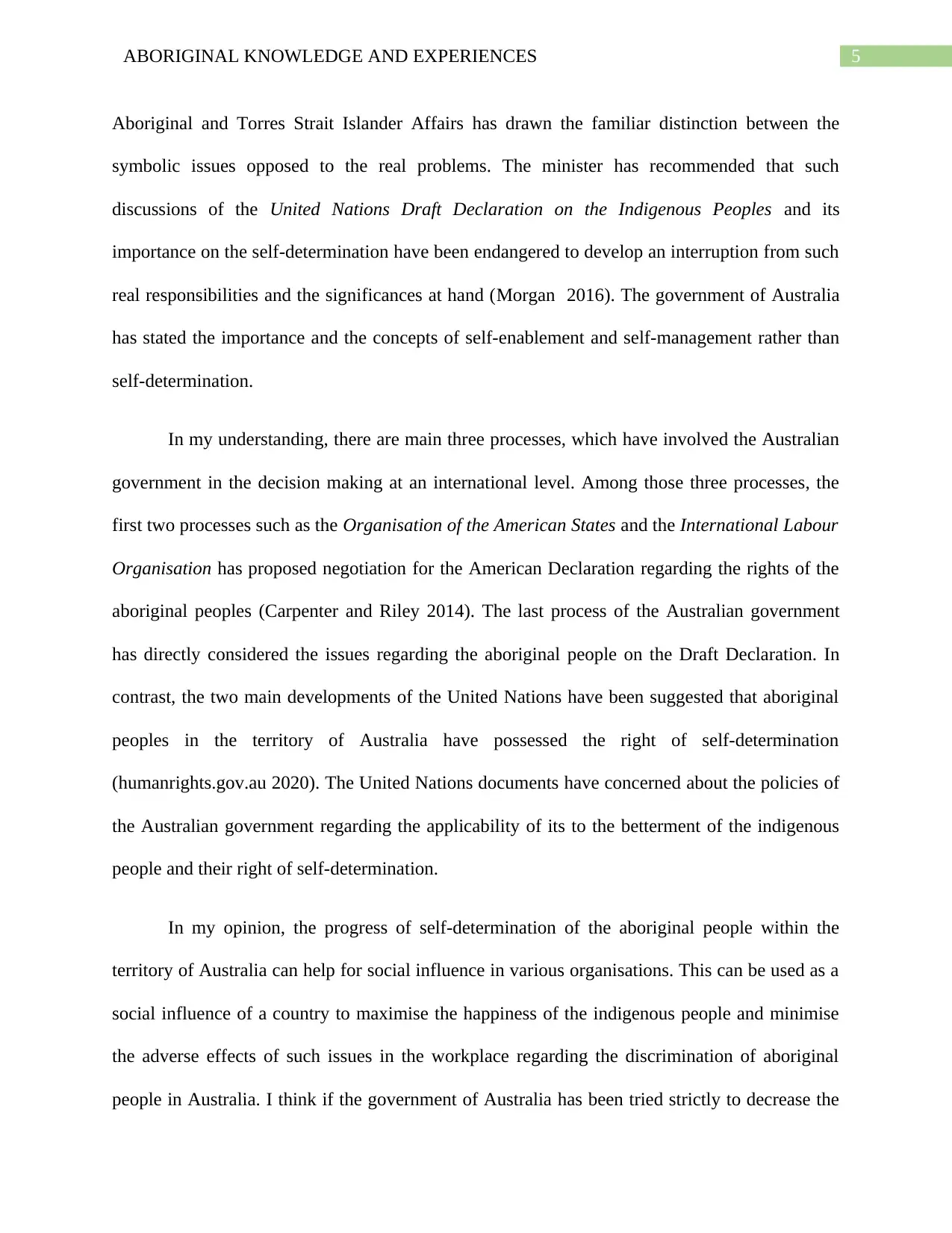
5ABORIGINAL KNOWLEDGE AND EXPERIENCES
Aboriginal and Torres Strait Islander Affairs has drawn the familiar distinction between the
symbolic issues opposed to the real problems. The minister has recommended that such
discussions of the United Nations Draft Declaration on the Indigenous Peoples and its
importance on the self-determination have been endangered to develop an interruption from such
real responsibilities and the significances at hand (Morgan 2016). The government of Australia
has stated the importance and the concepts of self-enablement and self-management rather than
self-determination.
In my understanding, there are main three processes, which have involved the Australian
government in the decision making at an international level. Among those three processes, the
first two processes such as the Organisation of the American States and the International Labour
Organisation has proposed negotiation for the American Declaration regarding the rights of the
aboriginal peoples (Carpenter and Riley 2014). The last process of the Australian government
has directly considered the issues regarding the aboriginal people on the Draft Declaration. In
contrast, the two main developments of the United Nations have been suggested that aboriginal
peoples in the territory of Australia have possessed the right of self-determination
(humanrights.gov.au 2020). The United Nations documents have concerned about the policies of
the Australian government regarding the applicability of its to the betterment of the indigenous
people and their right of self-determination.
In my opinion, the progress of self-determination of the aboriginal people within the
territory of Australia can help for social influence in various organisations. This can be used as a
social influence of a country to maximise the happiness of the indigenous people and minimise
the adverse effects of such issues in the workplace regarding the discrimination of aboriginal
people in Australia. I think if the government of Australia has been tried strictly to decrease the
Aboriginal and Torres Strait Islander Affairs has drawn the familiar distinction between the
symbolic issues opposed to the real problems. The minister has recommended that such
discussions of the United Nations Draft Declaration on the Indigenous Peoples and its
importance on the self-determination have been endangered to develop an interruption from such
real responsibilities and the significances at hand (Morgan 2016). The government of Australia
has stated the importance and the concepts of self-enablement and self-management rather than
self-determination.
In my understanding, there are main three processes, which have involved the Australian
government in the decision making at an international level. Among those three processes, the
first two processes such as the Organisation of the American States and the International Labour
Organisation has proposed negotiation for the American Declaration regarding the rights of the
aboriginal peoples (Carpenter and Riley 2014). The last process of the Australian government
has directly considered the issues regarding the aboriginal people on the Draft Declaration. In
contrast, the two main developments of the United Nations have been suggested that aboriginal
peoples in the territory of Australia have possessed the right of self-determination
(humanrights.gov.au 2020). The United Nations documents have concerned about the policies of
the Australian government regarding the applicability of its to the betterment of the indigenous
people and their right of self-determination.
In my opinion, the progress of self-determination of the aboriginal people within the
territory of Australia can help for social influence in various organisations. This can be used as a
social influence of a country to maximise the happiness of the indigenous people and minimise
the adverse effects of such issues in the workplace regarding the discrimination of aboriginal
people in Australia. I think if the government of Australia has been tried strictly to decrease the
⊘ This is a preview!⊘
Do you want full access?
Subscribe today to unlock all pages.

Trusted by 1+ million students worldwide
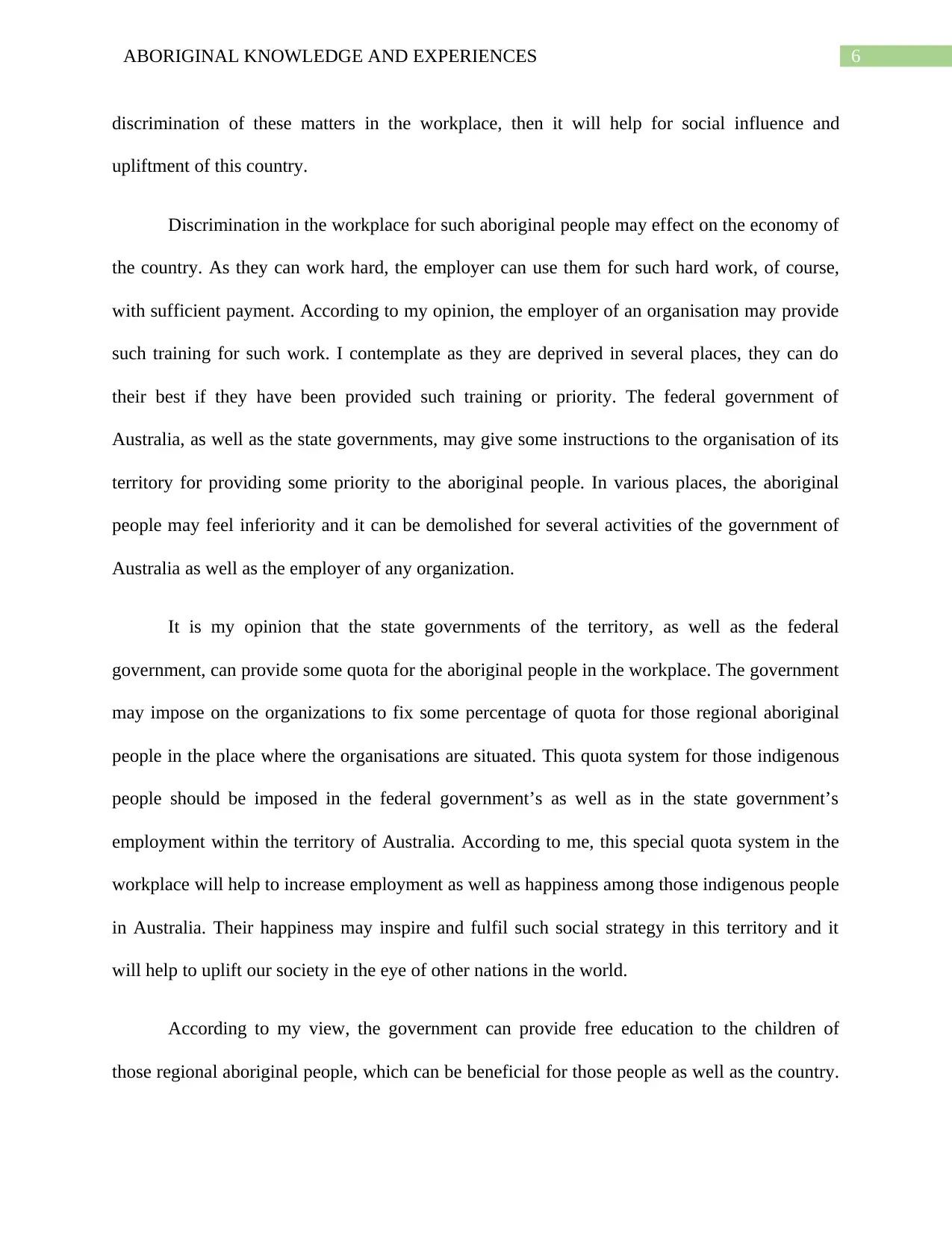
6ABORIGINAL KNOWLEDGE AND EXPERIENCES
discrimination of these matters in the workplace, then it will help for social influence and
upliftment of this country.
Discrimination in the workplace for such aboriginal people may effect on the economy of
the country. As they can work hard, the employer can use them for such hard work, of course,
with sufficient payment. According to my opinion, the employer of an organisation may provide
such training for such work. I contemplate as they are deprived in several places, they can do
their best if they have been provided such training or priority. The federal government of
Australia, as well as the state governments, may give some instructions to the organisation of its
territory for providing some priority to the aboriginal people. In various places, the aboriginal
people may feel inferiority and it can be demolished for several activities of the government of
Australia as well as the employer of any organization.
It is my opinion that the state governments of the territory, as well as the federal
government, can provide some quota for the aboriginal people in the workplace. The government
may impose on the organizations to fix some percentage of quota for those regional aboriginal
people in the place where the organisations are situated. This quota system for those indigenous
people should be imposed in the federal government’s as well as in the state government’s
employment within the territory of Australia. According to me, this special quota system in the
workplace will help to increase employment as well as happiness among those indigenous people
in Australia. Their happiness may inspire and fulfil such social strategy in this territory and it
will help to uplift our society in the eye of other nations in the world.
According to my view, the government can provide free education to the children of
those regional aboriginal people, which can be beneficial for those people as well as the country.
discrimination of these matters in the workplace, then it will help for social influence and
upliftment of this country.
Discrimination in the workplace for such aboriginal people may effect on the economy of
the country. As they can work hard, the employer can use them for such hard work, of course,
with sufficient payment. According to my opinion, the employer of an organisation may provide
such training for such work. I contemplate as they are deprived in several places, they can do
their best if they have been provided such training or priority. The federal government of
Australia, as well as the state governments, may give some instructions to the organisation of its
territory for providing some priority to the aboriginal people. In various places, the aboriginal
people may feel inferiority and it can be demolished for several activities of the government of
Australia as well as the employer of any organization.
It is my opinion that the state governments of the territory, as well as the federal
government, can provide some quota for the aboriginal people in the workplace. The government
may impose on the organizations to fix some percentage of quota for those regional aboriginal
people in the place where the organisations are situated. This quota system for those indigenous
people should be imposed in the federal government’s as well as in the state government’s
employment within the territory of Australia. According to me, this special quota system in the
workplace will help to increase employment as well as happiness among those indigenous people
in Australia. Their happiness may inspire and fulfil such social strategy in this territory and it
will help to uplift our society in the eye of other nations in the world.
According to my view, the government can provide free education to the children of
those regional aboriginal people, which can be beneficial for those people as well as the country.
Paraphrase This Document
Need a fresh take? Get an instant paraphrase of this document with our AI Paraphraser
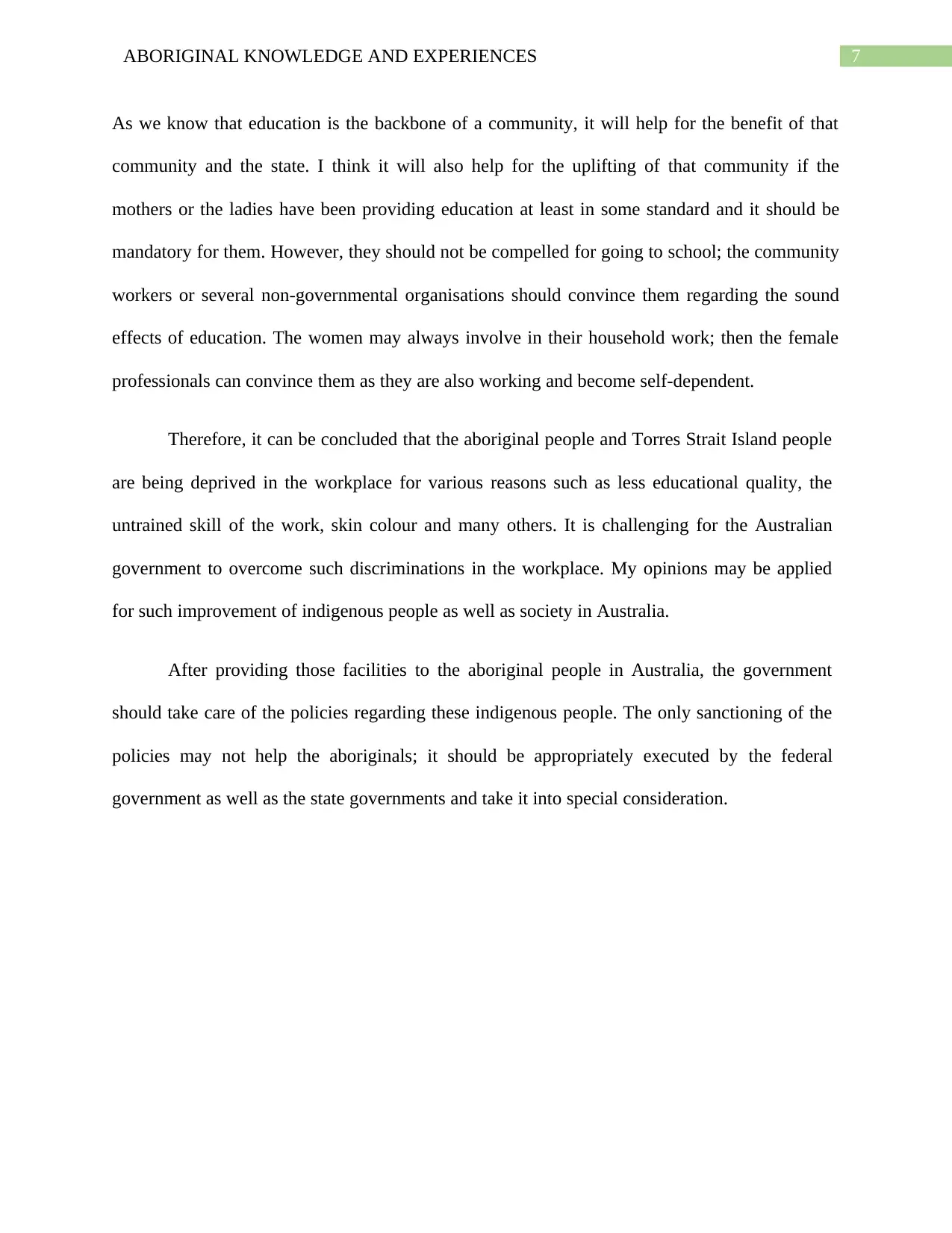
7ABORIGINAL KNOWLEDGE AND EXPERIENCES
As we know that education is the backbone of a community, it will help for the benefit of that
community and the state. I think it will also help for the uplifting of that community if the
mothers or the ladies have been providing education at least in some standard and it should be
mandatory for them. However, they should not be compelled for going to school; the community
workers or several non-governmental organisations should convince them regarding the sound
effects of education. The women may always involve in their household work; then the female
professionals can convince them as they are also working and become self-dependent.
Therefore, it can be concluded that the aboriginal people and Torres Strait Island people
are being deprived in the workplace for various reasons such as less educational quality, the
untrained skill of the work, skin colour and many others. It is challenging for the Australian
government to overcome such discriminations in the workplace. My opinions may be applied
for such improvement of indigenous people as well as society in Australia.
After providing those facilities to the aboriginal people in Australia, the government
should take care of the policies regarding these indigenous people. The only sanctioning of the
policies may not help the aboriginals; it should be appropriately executed by the federal
government as well as the state governments and take it into special consideration.
As we know that education is the backbone of a community, it will help for the benefit of that
community and the state. I think it will also help for the uplifting of that community if the
mothers or the ladies have been providing education at least in some standard and it should be
mandatory for them. However, they should not be compelled for going to school; the community
workers or several non-governmental organisations should convince them regarding the sound
effects of education. The women may always involve in their household work; then the female
professionals can convince them as they are also working and become self-dependent.
Therefore, it can be concluded that the aboriginal people and Torres Strait Island people
are being deprived in the workplace for various reasons such as less educational quality, the
untrained skill of the work, skin colour and many others. It is challenging for the Australian
government to overcome such discriminations in the workplace. My opinions may be applied
for such improvement of indigenous people as well as society in Australia.
After providing those facilities to the aboriginal people in Australia, the government
should take care of the policies regarding these indigenous people. The only sanctioning of the
policies may not help the aboriginals; it should be appropriately executed by the federal
government as well as the state governments and take it into special consideration.
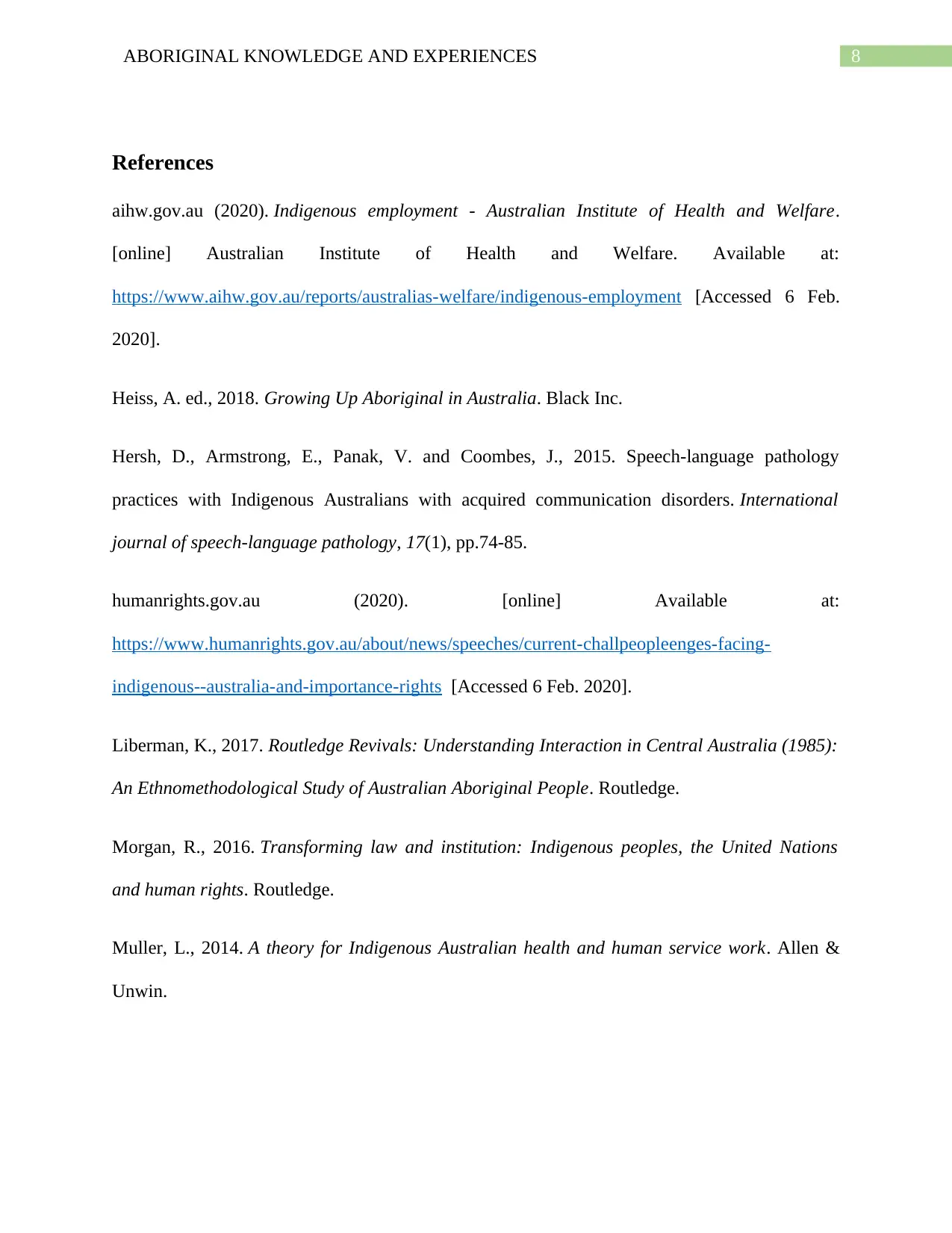
8ABORIGINAL KNOWLEDGE AND EXPERIENCES
References
aihw.gov.au (2020). Indigenous employment - Australian Institute of Health and Welfare.
[online] Australian Institute of Health and Welfare. Available at:
https://www.aihw.gov.au/reports/australias-welfare/indigenous-employment [Accessed 6 Feb.
2020].
Heiss, A. ed., 2018. Growing Up Aboriginal in Australia. Black Inc.
Hersh, D., Armstrong, E., Panak, V. and Coombes, J., 2015. Speech-language pathology
practices with Indigenous Australians with acquired communication disorders. International
journal of speech-language pathology, 17(1), pp.74-85.
humanrights.gov.au (2020). [online] Available at:
https://www.humanrights.gov.au/about/news/speeches/current-challpeopleenges-facing-
indigenous--australia-and-importance-rights [Accessed 6 Feb. 2020].
Liberman, K., 2017. Routledge Revivals: Understanding Interaction in Central Australia (1985):
An Ethnomethodological Study of Australian Aboriginal People. Routledge.
Morgan, R., 2016. Transforming law and institution: Indigenous peoples, the United Nations
and human rights. Routledge.
Muller, L., 2014. A theory for Indigenous Australian health and human service work. Allen &
Unwin.
References
aihw.gov.au (2020). Indigenous employment - Australian Institute of Health and Welfare.
[online] Australian Institute of Health and Welfare. Available at:
https://www.aihw.gov.au/reports/australias-welfare/indigenous-employment [Accessed 6 Feb.
2020].
Heiss, A. ed., 2018. Growing Up Aboriginal in Australia. Black Inc.
Hersh, D., Armstrong, E., Panak, V. and Coombes, J., 2015. Speech-language pathology
practices with Indigenous Australians with acquired communication disorders. International
journal of speech-language pathology, 17(1), pp.74-85.
humanrights.gov.au (2020). [online] Available at:
https://www.humanrights.gov.au/about/news/speeches/current-challpeopleenges-facing-
indigenous--australia-and-importance-rights [Accessed 6 Feb. 2020].
Liberman, K., 2017. Routledge Revivals: Understanding Interaction in Central Australia (1985):
An Ethnomethodological Study of Australian Aboriginal People. Routledge.
Morgan, R., 2016. Transforming law and institution: Indigenous peoples, the United Nations
and human rights. Routledge.
Muller, L., 2014. A theory for Indigenous Australian health and human service work. Allen &
Unwin.
⊘ This is a preview!⊘
Do you want full access?
Subscribe today to unlock all pages.

Trusted by 1+ million students worldwide
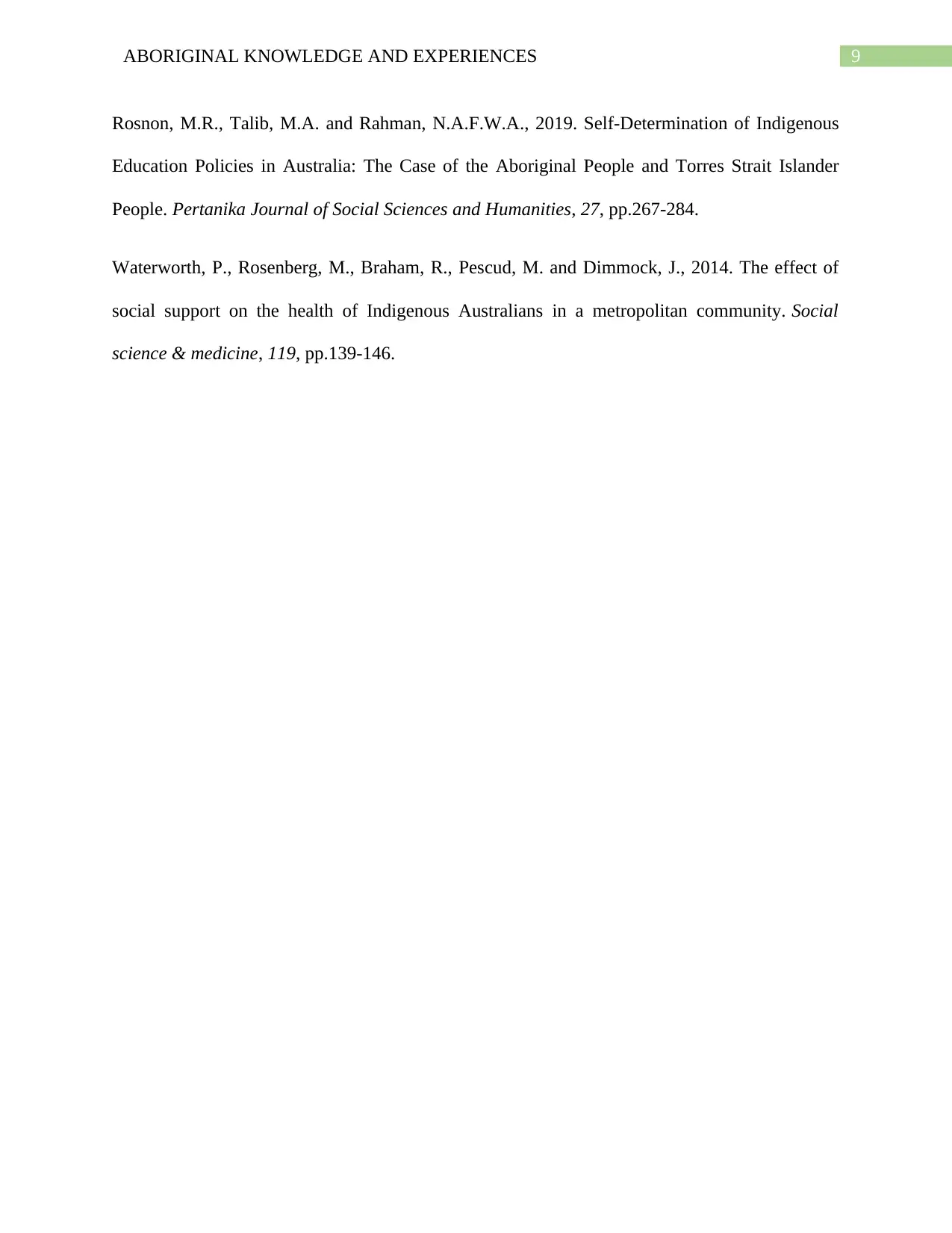
9ABORIGINAL KNOWLEDGE AND EXPERIENCES
Rosnon, M.R., Talib, M.A. and Rahman, N.A.F.W.A., 2019. Self-Determination of Indigenous
Education Policies in Australia: The Case of the Aboriginal People and Torres Strait Islander
People. Pertanika Journal of Social Sciences and Humanities, 27, pp.267-284.
Waterworth, P., Rosenberg, M., Braham, R., Pescud, M. and Dimmock, J., 2014. The effect of
social support on the health of Indigenous Australians in a metropolitan community. Social
science & medicine, 119, pp.139-146.
Rosnon, M.R., Talib, M.A. and Rahman, N.A.F.W.A., 2019. Self-Determination of Indigenous
Education Policies in Australia: The Case of the Aboriginal People and Torres Strait Islander
People. Pertanika Journal of Social Sciences and Humanities, 27, pp.267-284.
Waterworth, P., Rosenberg, M., Braham, R., Pescud, M. and Dimmock, J., 2014. The effect of
social support on the health of Indigenous Australians in a metropolitan community. Social
science & medicine, 119, pp.139-146.
1 out of 10
Related Documents
Your All-in-One AI-Powered Toolkit for Academic Success.
+13062052269
info@desklib.com
Available 24*7 on WhatsApp / Email
![[object Object]](/_next/static/media/star-bottom.7253800d.svg)
Unlock your academic potential
Copyright © 2020–2026 A2Z Services. All Rights Reserved. Developed and managed by ZUCOL.





